NewsBeat
Would you make a good Traitor? Take our quiz

The latest series of The Traitors is coming to an end, after weeks of wild accusations, wilder betrayals and Claudia Winkleman’s devious looks-to-camera.
Many of us like to think we could handle the pressures and skullduggery of being a traitor in the remote Scottish castle. But could you really make it to the end undetected?
Work through our scenarios – from sitting at the roundtable with Claudia to rowing across an icy loch – to find out if you’ve got what it takes to be a treacherous mastermind, or whether you are far too faithful for that.
Quiz compiled by: Steven McIntosh, Helen Bushby, Yasmin Rufo, Rosemary McCabe, Jonathan Holmes
NewsBeat
Southport killer was known to services that failed – as former social worker warns over ‘holes in the system’ | UK News
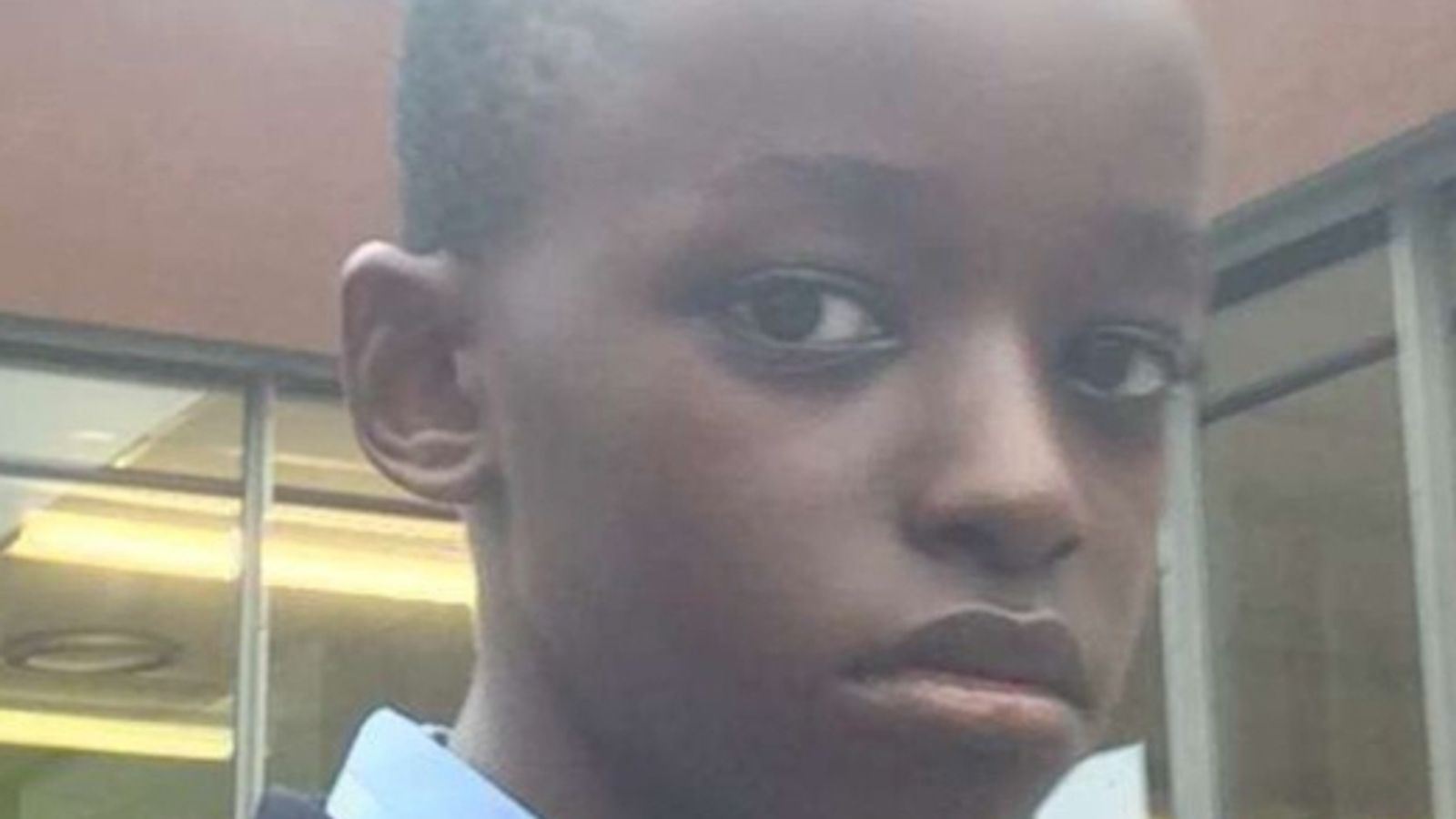
When the police arrived at the scene of horror in Southport last summer, the teenager holding the knife was someone they had been called about many times before.
From the age of 13, Axel Rudakubana had been on the radar of police, safeguarding services, mental health teams and Prevent, the counterterrorism programme.
His obsession with mass murder was known about. The risk he posed was clear.
Yet there was nothing to stop him going to a dance class, murdering Alice da Silva Aguiar, nine, Bebe King, six, and Elsie Dot Stancombe, seven, and attempting to murder many more.
The timeline of contact with the authorities reveals Rudakubana had not slipped through the net – he was in the system. It failed.
The public inquiry that will now take place needs to examine why.
‘Limited options for social workers’
Dr Ciaran Murphy, a former social worker and member of the Association of Child Protection Professionals, believes services designed to protect children are now facing more cases where children are themselves the risk.
“That’s an area where we need to evolve,” he said. “There’s an increasing occurrence of referrals being made in which parents are afraid of their children in terms of violence and mental health.”
He said options for social workers are limited. “You’d still be thinking about the child protection plan, you’d still be thinking about a strategy meeting,” he said. “But ultimately, social workers cannot detain children.
“The obvious answers are multi-agency communication, multi-agency work, particularly with the police and programmes like Prevent. But then when you do that, you start to see some of the holes in the system.”
“In extreme cases, they can apply for a secure order for a child in which a child is placed in secure accommodation,” Dr Murphy explained, but he said they are “very difficult to obtain, partly because it’s so costly, partly because it’s so draconian”.
The orders have to be granted by the family courts and only apply to children under the age of 16.
Rudakubana’s multiple contact with police
The police were first alerted to Rudakubana when he took a knife into school in 2019. It led to his exclusion, and referrals to the Multi-Agency Safeguarding Hub (MASH) and the Child and Adolescent Mental Health Service (CAMHS).
But he returned to the school months later with a knife in his bag and attacked a pupil with a hockey stick. He pleaded guilty to assault and a youth referral order was imposed.
Between 2019 and 2021 he was referred three times to Prevent. The first referral was for researching school shootings during an IT class. Another referral was made when a teacher found he’d been reading about the London Bridge terror attack. However, he was not deemed a terrorism risk.
In 2021, Rudabukana was diagnosed with autism spectrum disorder. Later that year, following reports of incidents at home, he stopped attending school.
In 2022, his mother reported him missing and police found him on a bus carrying a knife. Officers were called by the driver because he was refusing to pay. He was returned home and his mother was given advice on how to secure knives.
Four of the calls to the police about him in the years before the attack were made by his own parents.
Read more:
Rudakubana received second longest sentence in history – No 10
Attorney general to review ‘unduly lenient’ sentence
‘They often don’t fit into any particular box’
Dr Duncan Harding, a consultant adolescent forensic psychiatrist, said “a case like this just highlights how systems have to be made as robust as possible, to try and pick up people who perhaps are acting in a lone way with extreme ideologies. Perhaps ideologies don’t fit into any particular box”.
“Working with young people, who present with perhaps mental health difficulties, perhaps neurodiversity, criminal behaviours. I’ve worked with many young people who fit into that category, and they often don’t fit into any particular box. What that can mean is that they might fall under the threshold of any one particular service.”
He added: “I think that when something dreadful happens, when something absolutely dreadful happens that shakes society in this way, we have to look at the systems, we have to look at things like thresholds.”
There is consensus that more should have been done to stop Rudakubana.
Finding the cracks in a system that failed will be the task of the public inquiry.
Politics
‘Real pain ahead’ for Keir Starmer as Donald Trump enacts US masterplan that Ben Habib warns will ‘take Britain to the cleaners’
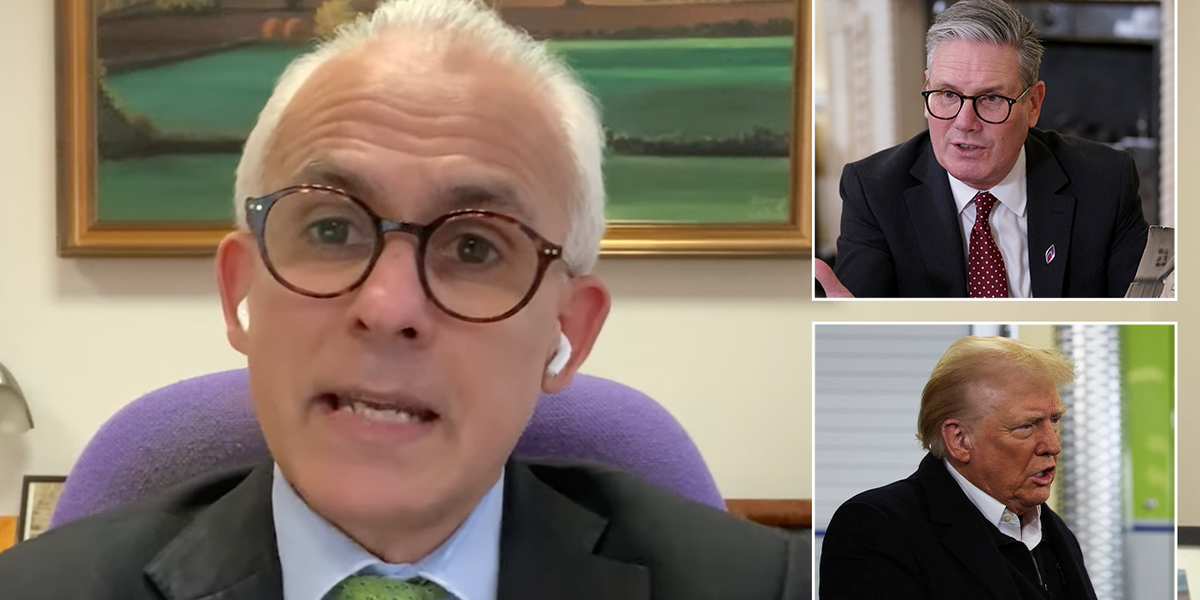
Donald Trump’s plan to prioritise America promises ‘pain’ for Great Britain, according to political commentator Ben Habib.
Speaking on GBN America, Habib said Keir Starmer should mimic the US president’s agenda to avoid being “taken to the cleaners” economically.
But the Prime Minister appears at odds with the new president ideologically and Habib has little faith in Starmer following his counterpart’s lead.
“We should have our own independent foreign policy”, Habib said on GBN America.
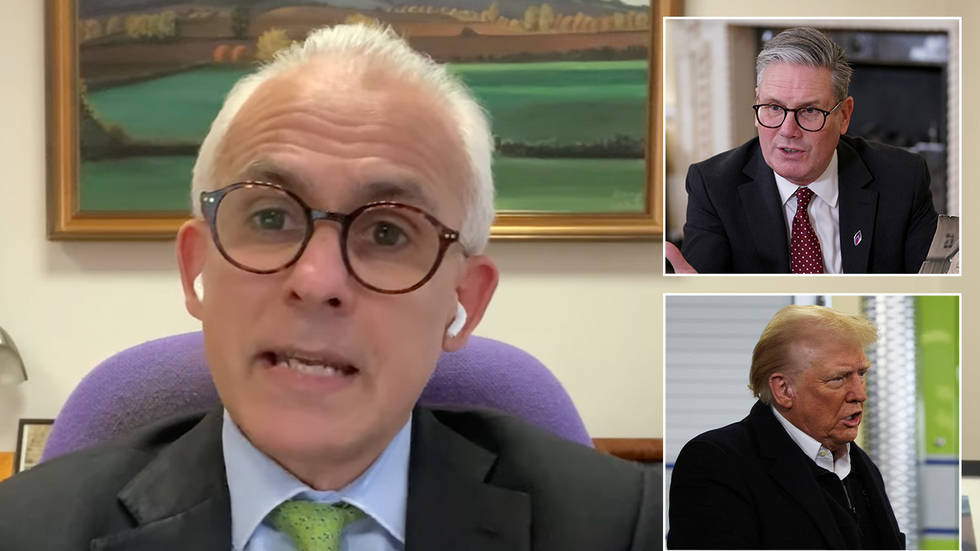
Trump’s plans could ‘send Britain to the cleaners’, Ben Habib warned
GB NEWS / PA / REUTERS
“I think what Donald Trump is doing for America is putting the US first, and there will be pain in that for the United Kingdom.
“What we’ve got to recognise, and this is on his domestic policy, is that if we don’t mimic that, we’re going to be taken to the cleaners economically.
LATEST DEVELOPMENTS
 Trump takes the oath of office as his wife Melania Trump holds the bible at his first inauguration in 2017Getty
Trump takes the oath of office as his wife Melania Trump holds the bible at his first inauguration in 2017Getty“As I say, young, bright individuals will all flock to the US because it will offer them a much better home.
“This isn’t about me saying, ‘I love Trump so the UK should follow what Trump wants’, I’m saying his agenda is the right one and it will cause us real pain unless we do the same agenda.
“It also happens to be an agenda which I have been campaigning for over the last 4-5 years.”
It comes after Trump issued a stark warning to global businesses, declaring they will face tariffs if they don’t manufacture their products in the United States.
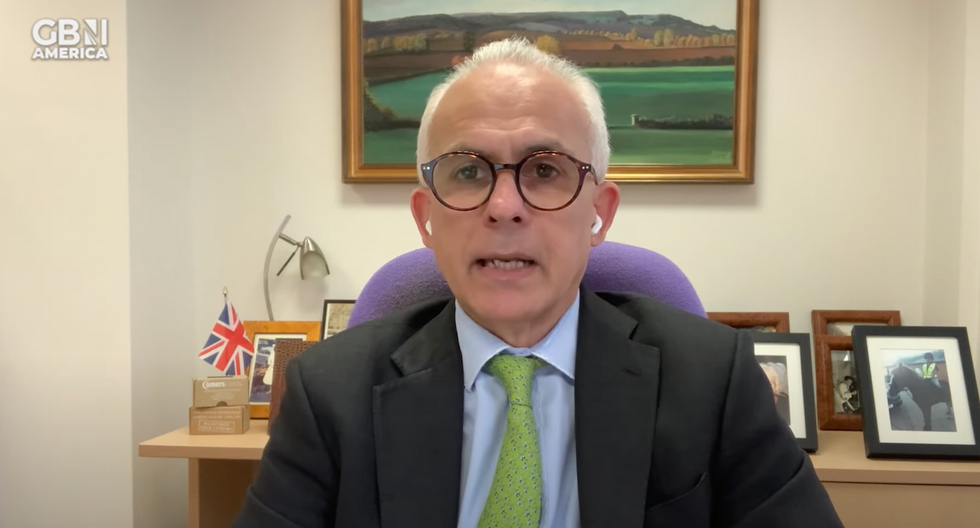
Ben Habib spoke on GBN America
GB NEWS
Speaking via videoconference at the World Economic Forum in Davos on Thursday, the US president delivered a clear ultimatum to companies worldwide.
“My message to every business in the world is very simple: Come make your product in America, and we will give you among the lowest taxes of any nation on Earth. But if you don’t, you will have to pay a tariff,” Trump said.
He announced plans to reduce the corporate tax rate from 21 per cent to 15 per cent for firms manufacturing in America.
The president specifically criticised the European Union’s regulatory system, citing his own failed real estate project in Ireland as evidence of bureaucratic obstacles to investment.
Trump also demanded NATO nations increase their defence spending to five per cent of GDP, far above the current two per cent threshold.
“I’m also going to ask all NATO nations to increase defence spending to five per cent of GDP, which is what it should have been years ago,” he told the Davos audience.
Later at the Oval Office, Trump questioned whether the US should spend anything on NATO, stating: “We are protecting them. They’re not protecting us.”
He accused the EU of unfair trade practices, claiming: “The EU does not take our farm products, does not take our cars, yet they send cars to us by the millions.”
NewsBeat
Girl, 13, denies killing 80-year-old man at park
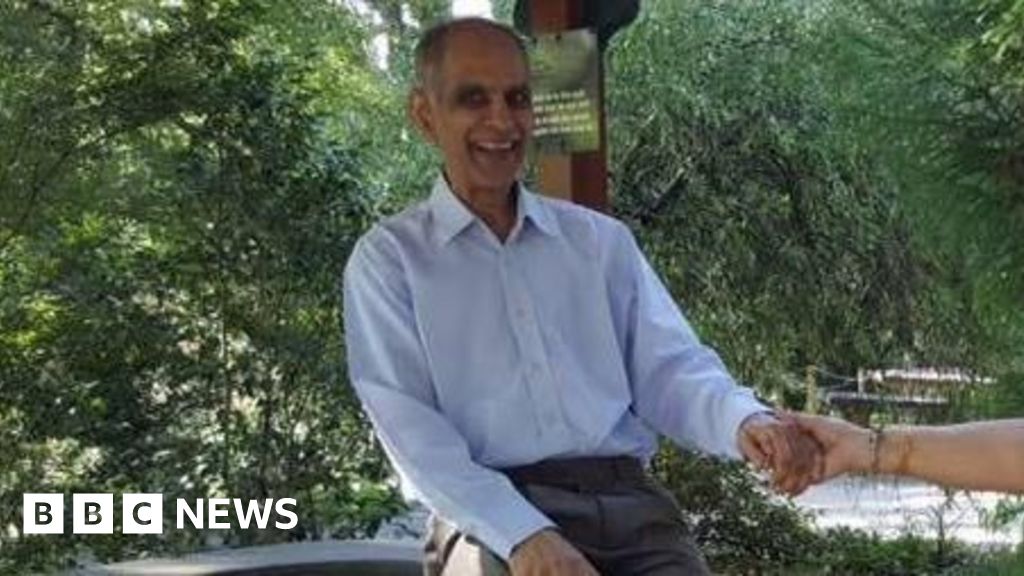
A 13-year-old girl has pleaded not guilty to the manslaughter of an 80-year-old man who was attacked in a park in Leicestershire.
Bhim Kohli died in hospital on 2 September after he was injured while walking his dog in Franklin Park, Braunstone Town, the previous day.
The girl, who cannot be named because of her age, denied the charge during a hearing at Leicester Crown Court on Friday.
She appeared alongside a 15-year-old boy, who pleaded not guilty to charges of murder and manslaughter at a hearing in December.
Judge Timothy Spencer KC remanded the boy into custody and granted the girl conditional bail until 17 February, when both children will go on trial at the same court.
Addressing the defendants, who were 14 and 12 at the time of the attack, he said: “Things are going to happen quite quickly from now on.”
The trial for both children is scheduled to last up to six weeks and will be heard by a High Court judge.
An inquest into Mr Kohli’s death was opened in November and gave a preliminary cause as a neck injury.
His family previously called him a “loving husband, dad and grandad” in a statement, adding: “He was also a son, brother and uncle. He adored his grandkids with all his heart and loved spending time with them.”
NewsBeat
Revealed: The Hamas-backed plan for Gaza’s future | World News
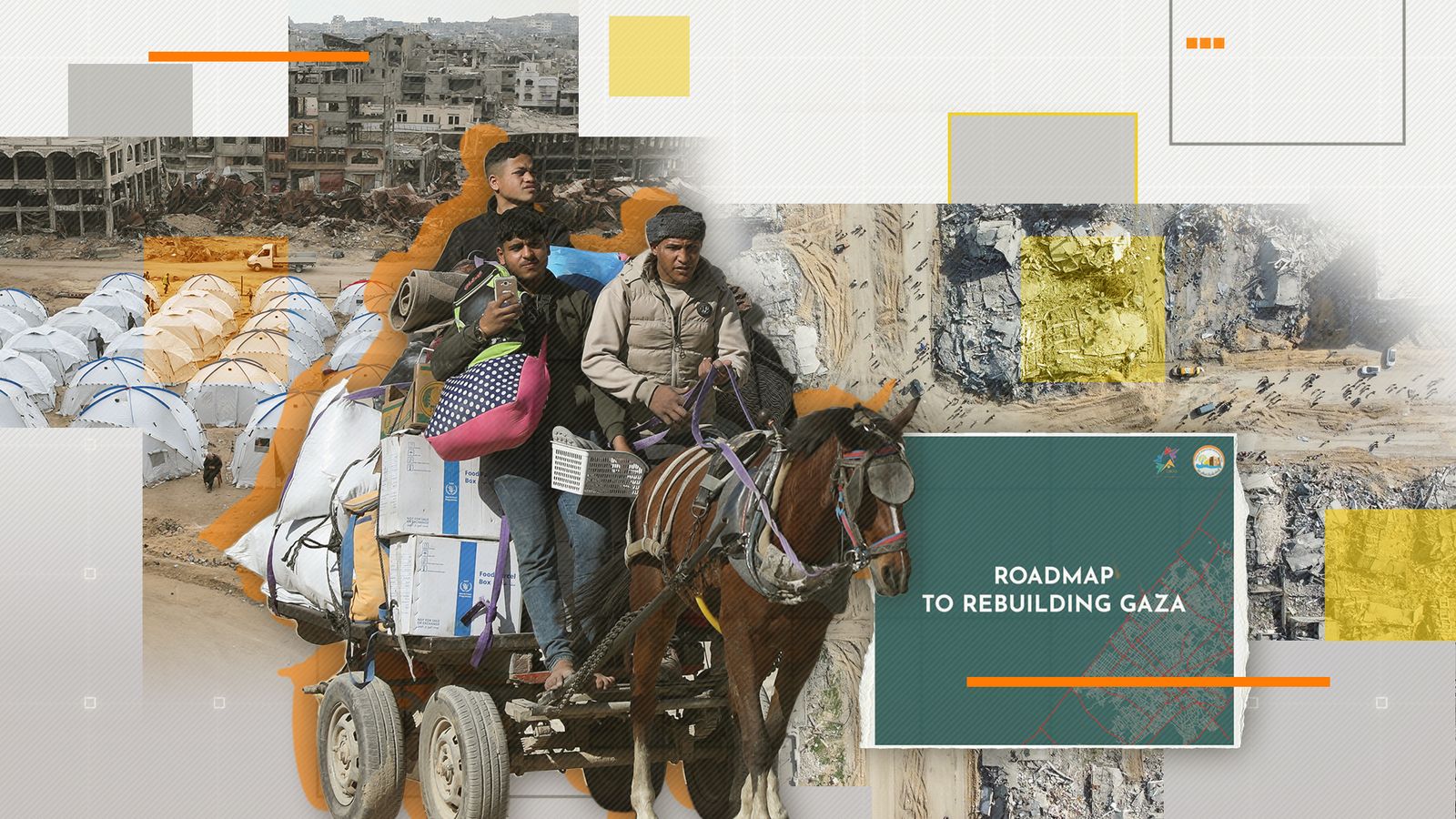
Gaza’s Hamas-run municipal governments have published their first official reconstruction plan for the Gaza Strip, in the latest sign that the group intends to be a leading actor in the rebuilding of the territory.
In recent days, Hamas has re-emerged as the area’s main governing authority, deploying security forces across the Gaza Strip, despite suffering severe military losses during its 15-month war with Israel.
The 200-page document, titled “Gaza Phoenix” and shared with Sky News by an official in Gaza City’s Hamas-led local government, is the first comprehensive reconstruction plan to be published since the war began.
Gaza Phoenix sets out short, medium and long-term priorities for reconstruction and development in the territory, starting almost from scratch.
The immediate priorities include formalising displacement camps, repairing hospitals, clearing rubble and restoring law and order.
There are also much more ambitious long-term proposals, including a tourism-focused economy, a green belt and even Dubai-style artificial islands.
One section, on “wartime resilience”, suggests constructing “an underground connecter” between all Gaza cities – a proposal likely to anger Israel, which has sought to destroy Hamas’s underground tunnel network.
International donors would be very unlikely to directly fund the activities of Gaza‘s Hamas-led municipal governments, a person familiar with reconstruction efforts told Sky News.
But the project could be delivered by aid groups, the source said, which have historically coordinated with Gaza’s local administrations.
Foreign donors, like the Gulf States, see reconstruction as an opportunity to have influence in post-war Gaza. However, they will have reservations over putting billions of dollars into Gaza’s reconstruction without an internationally agreed and comprehensive plan for stability, as well as assurances of some Palestinian autonomy.
Under the terms of the ceasefire deal, hundreds of thousands of Palestinians displaced from northern Gaza will be allowed to return from Sunday morning.
That makes reconstruction of the north particularly urgent, especially given the higher level of destruction there.
‘If they come, they will not find a place to live’
Dr Mohammad Salha, the director of North Gaza’s last remaining hospital, has not seen his wife and children since the war began.
He has been living in Al Awda Hospital, attempting to keep it running against all odds.
His family are staying in a tent in the south. Whenever it rains, he says, their tent fills with water.
“I want to bring them here, but I don’t know where to put them,” he says. “At least they have a tent. Here, there is nowhere to put a tent.”
Gaza’s government estimates that 14 of every 15 homes have been damaged, leaving the territory littered with an estimated 42 million tonnes of debris.
“If they come, they will not find a place to live,” says Maher Salem, 59, head of planning at Gaza City’s Hamas-led municipal government and a co-author of Gaza Phoenix.
Mr Salem says his team are trying to procure tents and caravans to serve as temporary shelters, and are preparing approximately 20 sites in and around Gaza City.
At least one new tent camp was seen in Gaza City on Thursday.
The reconstruction plan identifies four main zones for larger tent camps, to serve as displacement centres during the reconstruction.
These areas have been chosen because of their proximity to medical centres and relatively low levels of groundwater pollution.
More than 95% of the Gaza Strip has groundwater containing levels of nitrates considered unsafe by the WHO, according to maps published in the document.
Israel has yet to relax import restrictions, hampering reconstruction
The war has also wrought severe damage on Gaza’s water distribution network, with aid groups saying that 70% of water sent through the pipes is currently lost due to leakage.
“We have more than 100,000 metres of pipes that are destroyed, but we haven’t even got 10 metres of pipes for repairs,” says Mr Salem, who also manages water infrastructure in Gaza City.
Israel has so far refused to allow the entry of metal pipes into Gaza, arguing that they could be used to construct rockets.
Similar restrictions on other such “dual use” items have been in place since the war began, and in many cases long before.
Discussions about relaxing these rules post-ceasefire are ongoing, Mr Salem says.
He adds that officials are also trying to secure permission to import heavy machinery, generators and solar panels for the reconstruction effort.
“Everything is in relation to the availability of the materials. If you haven’t the materials, you can’t do the thing.”
Shaina Low, spokesperson for aid organisation Shelter Cluster, says the restrictions are affecting items necessary to build basic shelters, including timber and tent poles.
“There’s so much uncertainty, it makes it very difficult for the humanitarian sector to plan in advance,” she says.
‘Whoever is alive, they will come’
Of particular urgency are repairs to North Gaza’s hospitals. The region now has only one functioning hospital, Al Awda, after repeated raids and attacks by the Israeli military destroyed the Kamal Adwan and Beit Hanoun hospitals, and rendered the Indonesian and Sheikh Hamad hospitals out of service.
Al Awda has also suffered repeated attacks on its staff and buildings.
“A lot of equipment is destroyed,” says Dr Salha, the hospital’s director. “The whole hospital is without windows, without doors, without full ceilings.”
Many of the hospital’s surgeons have been killed or arrested, including Dr Adnan Al Bursh, whose unexplained death in Israeli custody was investigated by Sky News in November.
Despite now only having a single surgeon, Al Awda is preparing for a surge in patient numbers come Sunday, when displaced Palestinians are expected to begin their return to the north.
Dr Salha is also anticipating the arrival of “hundreds, maybe thousands” of wounded or starving people who have been in North Gaza but unable to safely reach the hospital.
“Whoever is alive, they will come,” he says.
A relatively small, private hospital, Al Awda has never had an intensive care unit, an oxygen unit or incubator beds. In the past, Al Awda would refer critical patients and newborns to the nearby Kamal Adwan Hospital.
“Now there is no Kamal Adwan Hospital,” says Dr Salha, “so we will have to do it.”
He has submitted a proposal for the construction of these advanced facilities, but this hinges on the relaxation of import restrictions.
Dr Salha thinks it will take three months before any other hospital in North Gaza is functioning. But Dr Marwan Sultan, the director of the Indonesian Hospital, thinks he can get his hospital up and running within a month.
That too, however, will depend on what he is allowed to import.
“All four generators have been destroyed, along with both oxygen units,” says Dr Sultan.
“These are not available in Gaza, so we have to bring it from outside, but this has not been allowed up till now.”
It will be months before schools can reopen
For those already living in the north of Gaza, the imminent arrival of the returnees poses its own problems.
Ahmed Abu Riziq lives with his wife and three young children in a rented flat in the north of Gaza City. He speaks to us from the building’s roof, which is littered with debris and shrapnel damage.
This week, his landlord is returning and he is being evicted.
He has given up hope of finding another flat. Instead, he is simply trying to find some empty land on which to pitch a tent amidst the rubble.
The destruction of homes in Gaza, and the immense quantities of debris strewn through its streets, has prompted many families to take shelter in schools.
“For more than one year the students have not gone to school, and they haven’t had any chance to go to school because all the schools are used as shelters,” says Mr Salem.
Satellite analysis by aid group Education Cluster suggests that 88% of schools in Gaza have been damaged, including every single school in North Gaza.
Mr Abu Riziq, a schoolteacher, thinks it will take between six to 12 months before schools are able to reopen.
That is echoed in the Gaza Phoenix reconstruction plan, which does not anticipate a resumption of schooling within the next six months.
For the time being, the best scenario for Gaza’s children is to enrol in one of the territory’s growing number of tent schools.
In May last year, Mr Abu Riziq set up his own tent school using the leftover parachute from an aid drop. He has since expanded to five schools, providing education and psychological support to around 2,000 children aged five to 14.
He is optimistic that, with proper support and counselling, Gaza’s children will be able to overcome their traumas.
“Most of our students, when we first tell them to draw, they draw tanks, destroyed houses, how they suffered,” he says.
“But now, after many sessions, they draw gardens, sunflowers, a plane they are in, trees with apples that they can eat. They start to draw their future.”
Additional reporting by Michelle Inez Simon, visual investigations producer, and Olive Enokido-Lineham, OSINT producer.
The Data and Forensics team is a multi-skilled unit dedicated to providing transparent journalism from Sky News. We gather, analyse and visualise data to tell data-driven stories. We combine traditional reporting skills with advanced analysis of satellite images, social media and other open source information. Through multimedia storytelling we aim to better explain the world while also showing how our journalism is done.
NewsBeat
Bulgarian woman based in UK denies spying for Russia
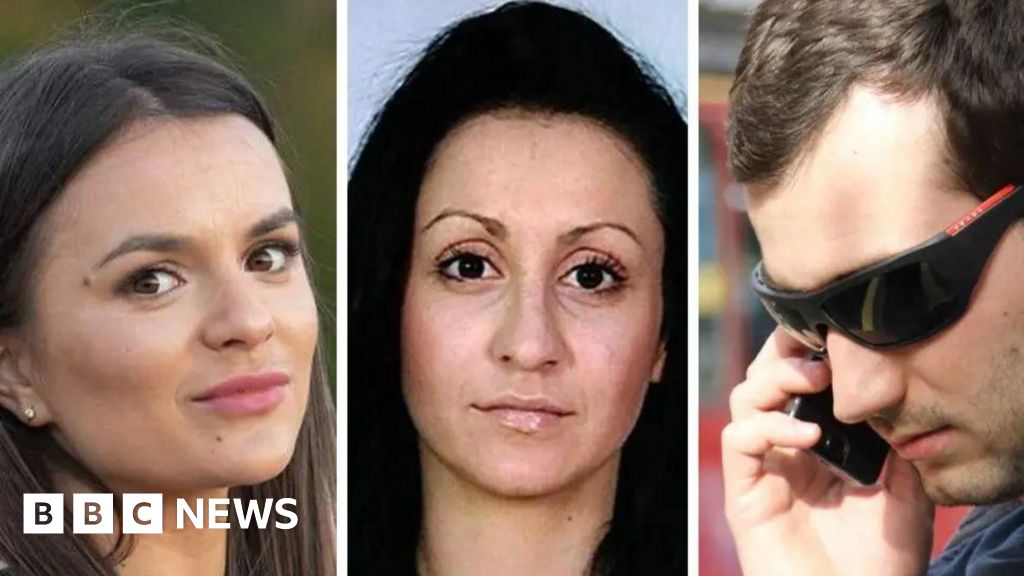
A Bulgarian woman charged with being part of a Russian spy cell operating in the UK has denied knowing that information she gathered would be sent to Russia.
Katrin Ivanova, 33, is accused of spying for Russia in a series of elaborate operations in the UK and Europe.
She allegedly targeted a US military base in Germany and secretly filmed two investigative journalists regarded as enemies of the Russian state.
Jurors have heard there was a risk the journalists could be kidnaped or assassinated.
Giving evidence for the first time, Ms Ivanova denied being a spy.
She accepted following people targeted by the operations, and travelling around Europe, but said she did not know the true purpose of the activity.
She said she believed one operation targeting the investigative journalist Christo Grozev was itself a form of journalism and would reveal to the public that he was corrupt.
“The plan was to try and expose Mr Grozev,” she said.
However, no information was ever published and “nothing actually happened”, she said.
She said her then-partner Biser Dzhambazov – whom she told the jury she had trusted with her life – asked her to take part in surveillance operations.
“He has been my partner for over 10 years. Why would he do something that’s going to hurt me,” she said.
The operations were to help Dzhambazov’s friend Orlin Roussev, who assisted the couple financially after they first moved to the UK in 2012, Ms Ivanova told the court.
The couple first met Roussev at East Croydon station in 2012, and went for dinner with him at a “posh” restaurant near the Thames, she said.
“I was very impressed with him,” she said. “He was someone I always wanted to be. He was a typical hero immigrant story.”
Both Dzhambazov and Roussev have already admitted conspiracy to spy for Russia.
Ms Ivanova wiped away tears in the witness box as she described learning how her partner was arrested in bed with the other alleged female spy in this trial, Vanya Gaberova, 30.
Jurors have heard that Dzhambazov and Ms Gaberova were in bed together when the police arrived to arrest them in February 2023.
She said Dzhambazov told her he had a brain tumour and went abroad for treatment. She now believes that was a lie so he could live a “parallel life” with Ms Gaberova.
The trial continues.
Politics
Tories and Reform could be ‘forced to merge’ as staggering new poll puts Nigel Farage on course to become next PM
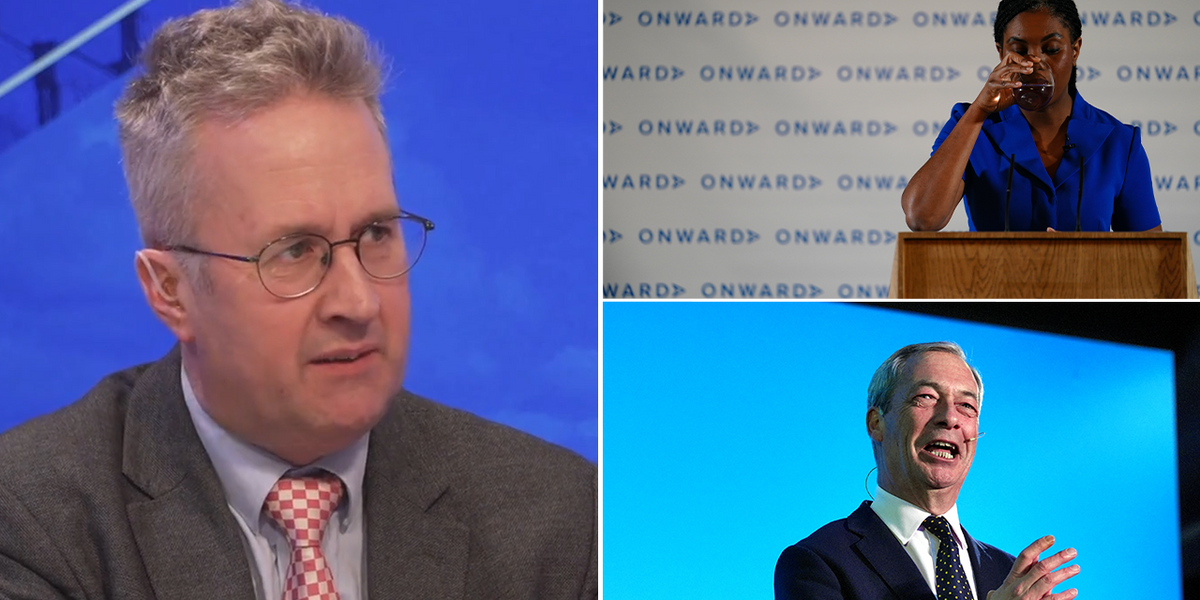
Reform UK has topped a national opinion poll for the first time, securing 26 per cent of voter support according to new data from Find Out Now.
The poll of 2,380 British adults puts Nigel Farage’s party three points ahead of Kemi Badenoch’s Conservatives at 23 per cent.
Labour trails in third place with 22 per cent, marking a significant shift in the political landscape just six months into their government.
The Liberal Democrats secured 12 per cent, followed by the Greens at 10 per cent and the SNP at 3 per cent.

Christopher Hope offered his snap reaction to the shock polling
GB NEWS / PA
GB News Political Editor Christopher Hope suggests the poll results could force a dramatic realignment in British politics.
According to Chopper’s analysis of seat projections, Reform UK would secure 190 MPs, with Labour on 161 and the Conservatives trailing at 141.
LATEST DEVELOPMENTS
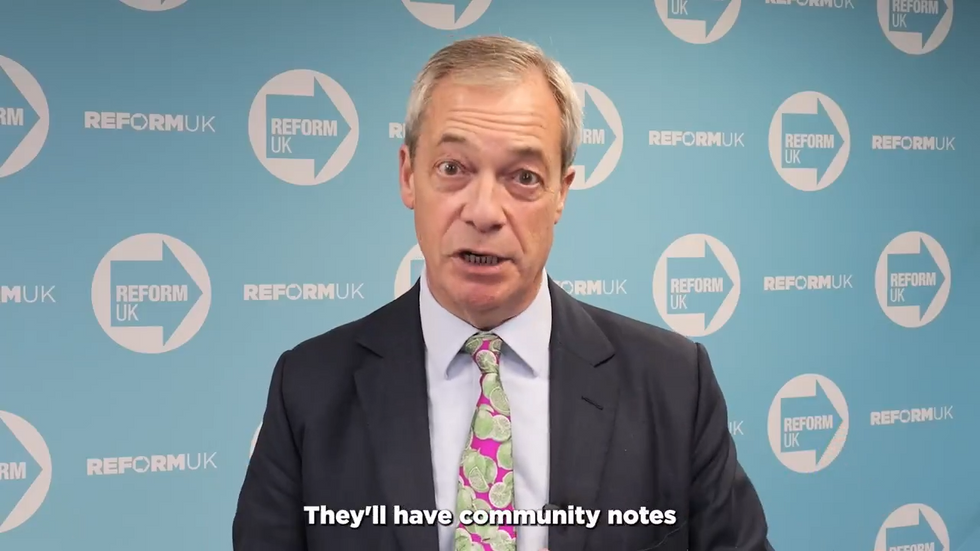
The poll of 2,380 British adults puts Nigel Farage’s party three points ahead of Kemi Badenoch’s Conservatives
X/ Nigel Farage
“It would basically force the Conservatives and Reform to merge,” Hope said, though he noted Tory leader Kemi Badenoch has previously dismissed such suggestions, questioning “why on Earth” she would merge with a party whose leader vowed to “destroy” the Conservatives.
Reform UK leader Nigel Farage responded to the poll on social media, declaring: “Reform LEADS for the first time in a national opinion poll. This is just the beginning.”
The party’s chairman Zia Yusuf firmly rejected suggestions of cooperation with the Conservatives, stating: “No pacts, no deals. Reform is headed for Government.”
Reform MP Rupert Lowe expressed confidence in the party’s trajectory, saying: “Reform now in the clear, leading a national opinion poll. I am more confident than ever that we will outright win the next general election.”
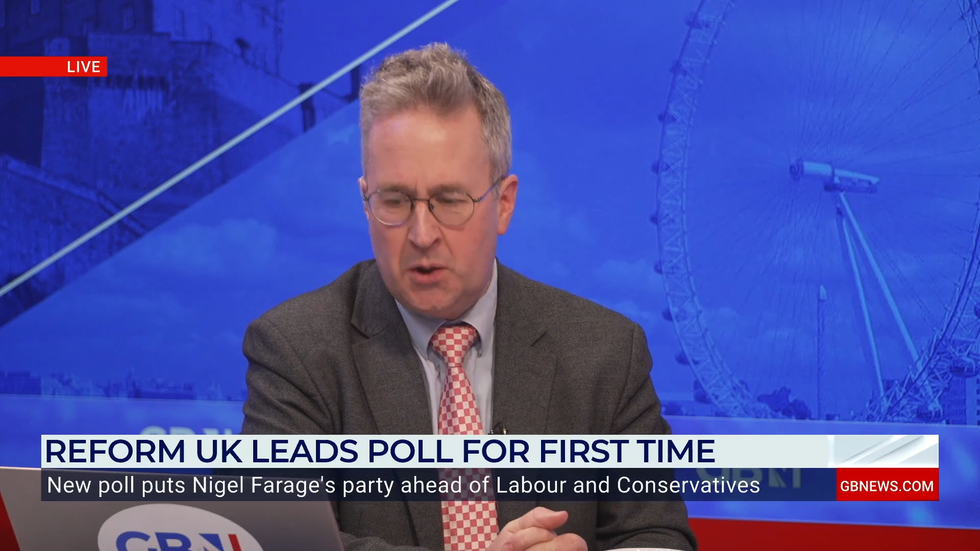
Chopper analysed the poll on GB News
GB NEWS
A Conservative spokesman for Kemi Badenoch downplayed the results, telling GB News: “Polls go up and down and change every week. We’re focused on what matters – the damage Labour is doing to the economy, our schools and our international standing.”
Labour dismissed the poll, with a party source saying they were focused on delivering their Plan for Change.
“While the opposition fight among themselves, the Labour Government is putting in the hard yards to deliver much-needed growth,” the source added.
The poll results come as Ipsos UK found confidence in the country’s direction has fallen to near pre-election levels, with 62 per cent saying the UK is going in the wrong direction.
The survey revealed widespread dissatisfaction with political leaders, with 52 per cent viewing Starmer unfavourably and 50 per cent expressing similar views about Labour.
Reform leader Farage faces his own challenges, with 51 per cent viewing him unfavourably, while 46 per cent hold negative views of Conservative leader Badenoch.
NewsBeat
Saudi Arabia asks Hans Zimmer to create new version of its national anthem


Saudi Arabia has asked legendary Oscar-winning composer Hans Zimmer to work on a new version of its national anthem, according to a senior official in the country.
NewsBeat
The Week: Trump Returns, the EU and No to NIMBYs?

Adam, Chris, Vicki and James discuss the political week in Westminster, and beyond.
Politics
Nigel Farage rages at Britain’s ‘dismal’ ability to stop terrorists as ‘disgraceful’ Axel Rudakubana failings laid bare
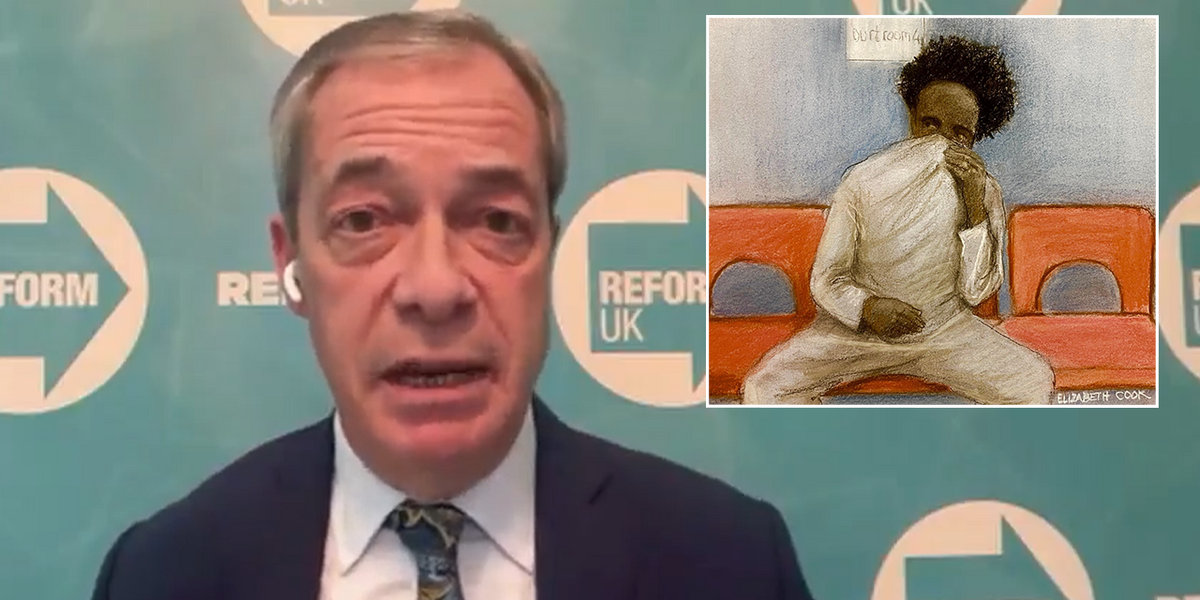
Nigel Farage has launched a scathing attack on Britain’s counter-terrorism capabilities, claiming the country’s “ability to stop terrorists is dismal”.
Speaking on GB News, the former UKIP leader criticised what he called a “cover-up” in the case of Southport killer Axel Rudakubana.
He said the Crown Prosecution Service’s decision to tell Merseyside Police not to release basic information about Rudakubana was “a real disgrace”.
“The head of the CPS, his head should roll,” Nigel declared.
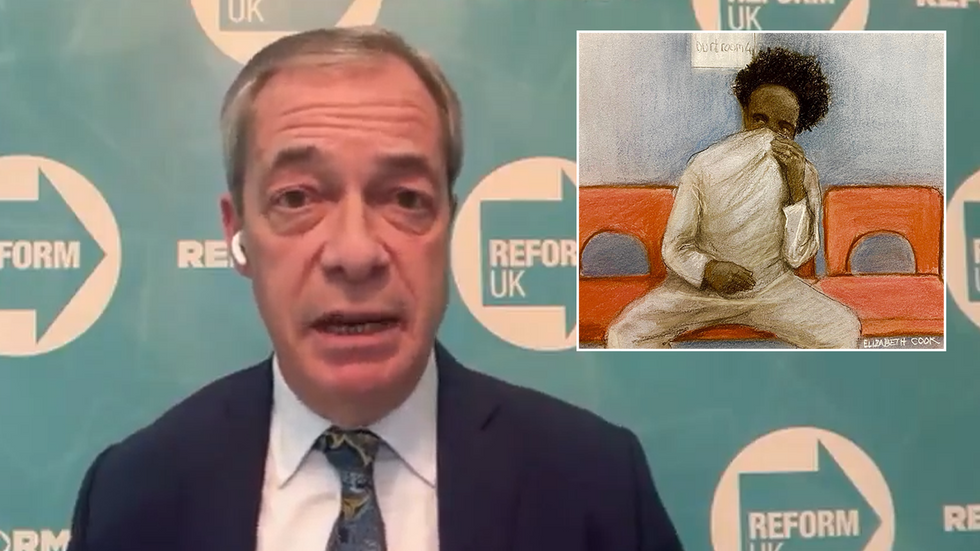
Nigel Farage hit out at the country’s failings in stopping Axel Rudakubana
GB NEWS / PA
Rudakubana had been referred to the government’s anti-extremism Prevent programme three times while at school due to his fixation with violence.
Police records show he had attacked a pupil with a hockey stick, carried knives into school and searched online for information about the London Bridge terror attack.
 Axel RudakubanaPA
Axel RudakubanaPALancashire Police were called to his home five times between 2019 and 2022 over concerning behaviour.
He was also under the care of Alder Hey Children’s Hospital’s mental health services from 2019 until February 2023, when he stopped engaging despite continued offers of support.
The 18-year-old was sentenced on Thursday to life imprisonment with a minimum term of 52 years for murdering three young girls at a Taylor Swift-themed dance class.
Rudakubana killed Bebe King, 6, Elsie Dot Stancombe, 7, and Alice da Silva Aguiar, 9, in Southport last July.
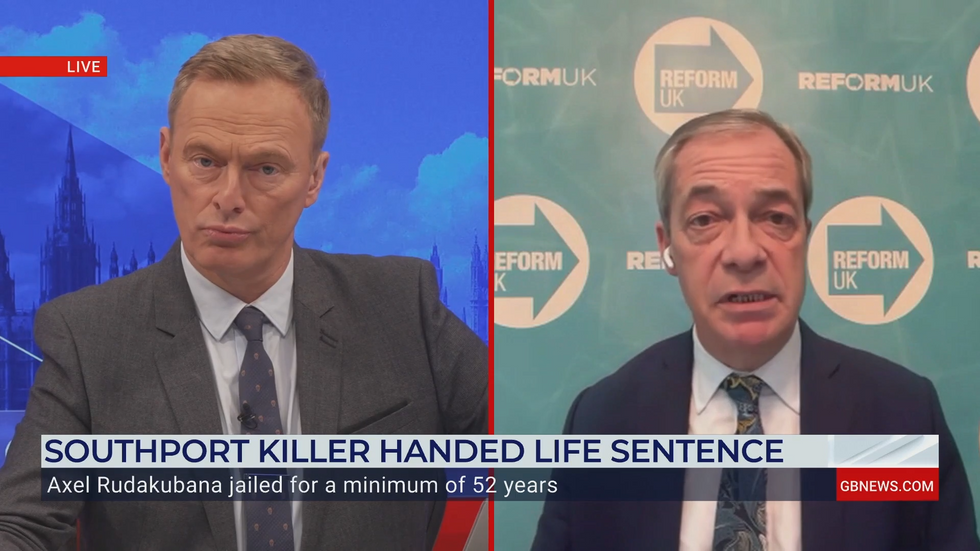
Nigel Farage spoke to Martin Daubney on GB News
GB NEWS
He also pleaded guilty to attempting to murder eight other children and two adults.
The sentence is the second-longest tariff on record in English history, after the Manchester Arena bomber’s brother.
Justice Goose said it was “highly likely” Rudakubana would never be free again.
“For daring to ask questions about this case, I got absolute vilification and hatred from senior politicians and mainstream broadcasters,” Nigel said.
He claimed both Kemi Badenoch and the Labour Party knew Rudakubana’s identity early on.
“If the public had known the truth about this guy, crazy conspiracies would not have spread online and the riots would have been nowhere near as bad,” he added.
Nigel criticised Sir Keir Starmer for only talking about “the far-right” while ignoring “evil ideologies allowed to persist within our community”.
A YouGov survey published today revealed that while 91 per cent of respondents blame Rudakubana for his actions, 70 per cent also hold counter-terrorism services responsible.
Home Secretary Yvette Cooper has ordered a “thorough review” of the Prevent referrals in this case.
A public inquiry will examine any “missed opportunities” to identify Rudakubana’s murderous intent.
The investigation remains “live”, according to Detective Chief Inspector Jason Pye, who has not ruled out further arrests in the case.
NewsBeat
UK’s plutonium to be readied for disposal
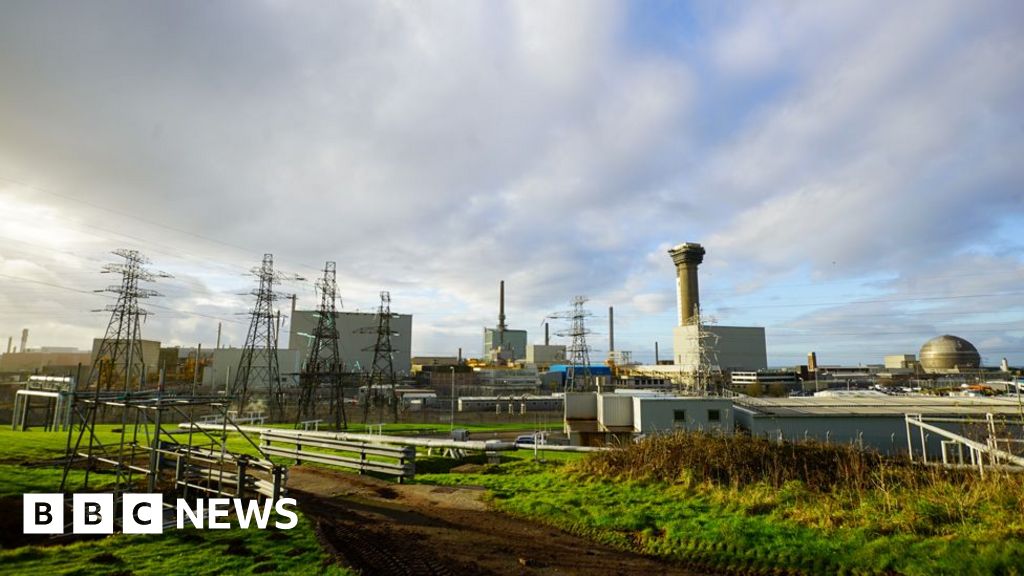
Science correspondent, BBC News
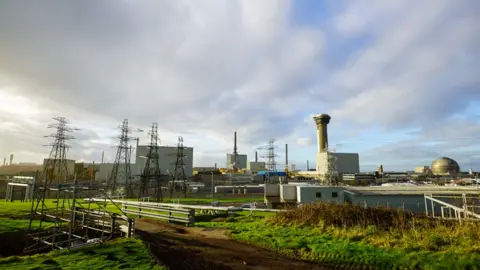 Getty Images
Getty ImagesThe government says it will dispose of its 140 tonnes of radioactive plutonium – currently stored at a secure facility at Sellafield in Cumbria.
The UK has the world’s largest stockpile of the hazardous material, which is a product of nuclear fuel reprocessing.
It has been kept at the site and has been piling up for decades in a form that would allow it to be recycled into new nuclear fuel.
But the government has now decided that it will not be reused and instead says it wants to put the hazardous material “beyond reach” and made ready for permanent disposal deep underground.
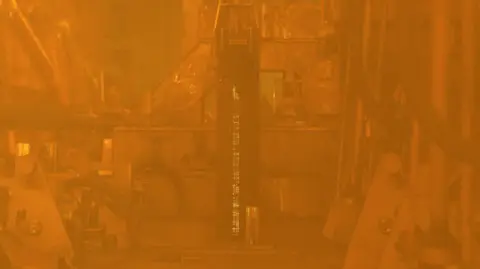 Kevin Church, BBC
Kevin Church, BBCWhen spent nuclear fuel is separated it into its component parts, one of the products is plutonium.
Successive governments have kept the material to leave open the option to recycle it into new nuclear fuel.
Storing this highly radioactive material – in its current form – is expensive and difficult. It needs to be frequently repackaged, because radiation damages the containers it’s kept in. And it’s guarded by armed police. All that costs the taxpayer more than £70m per year.
The government has made the decision that the safest – most economically viable solution – is to “immobilise” its entire plutonium stockpile.
That means that a facility will be built at Sellafield where the plutonium can be converted into a stable, rock-like material, which can eventually be disposed of deep underground.
In a statement, energy minister Michael Shanks said the objective was “to put this material beyond reach, into a form which both reduces the long-term safety and security burden during storage and ensures it is suitable for disposal”.
Nuclear materials scientist Dr Lewis Blackburn from the University of Sheffield said the plutonium would be “converted into a ceramic material” which, while still radioactive, is solid and stable so it is deemed safe to dispose of.
“The type of ceramic remains to be decided [and selecting the right material] is the subject of ongoing research.”
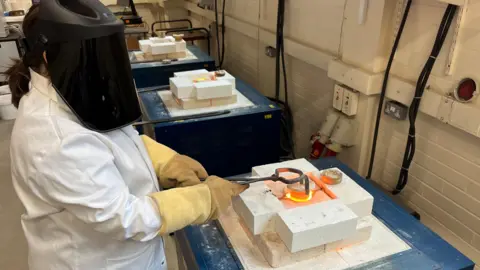 Kevin Church, BBC
Kevin Church, BBCNuclear waste expert Prof Claire Corkhill from the University of Bristol said the goverment’s decision was a “positive step”.
She told BBC News that it paved the way to removing the cost and hazard of storing plutonium at Sellafield “by transforming it and locking it away into a solid, durable material that will last for millions of years in a geological disposal facility”.
“These materials are based on those we find in nature – natural minerals, that we know have contained uranium for billions of years.”
The government is currently in the early stages of a long technical and political process of choosing a suitable site to build a deep geological facility that will eventually be the destination for all of the country’s most hazardous radioactive waste. That facility will not be operational until at least 2050.
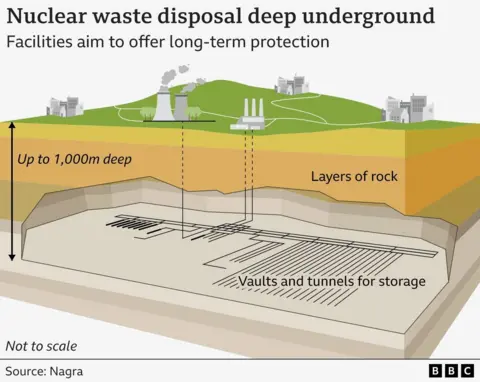
-

 Fashion8 years ago
Fashion8 years agoThese ’90s fashion trends are making a comeback in 2025
-

 Entertainment8 years ago
Entertainment8 years agoThe Season 9 ‘ Game of Thrones’ is here.
-

 Fashion8 years ago
Fashion8 years ago9 spring/summer 2025 fashion trends to know for next season
-

 Entertainment8 years ago
Entertainment8 years agoThe old and New Edition cast comes together to perform You’re Not My Kind of Girl.
-

 Sports8 years ago
Sports8 years agoEthical Hacker: “I’ll Show You Why Google Has Just Shut Down Their Quantum Chip”
-
Business8 years ago
Uber and Lyft are finally available in all of New York State
-
Entertainment8 years ago
Disney’s live-action Aladdin finally finds its stars
-
Sports8 years ago
Steph Curry finally got the contract he deserves from the Warriors
-
Entertainment8 years ago
Mod turns ‘Counter-Strike’ into a ‘Tekken’ clone with fighting chickens
-
Fashion8 years ago
Your comprehensive guide to this fall’s biggest trends





















You must be logged in to post a comment Login